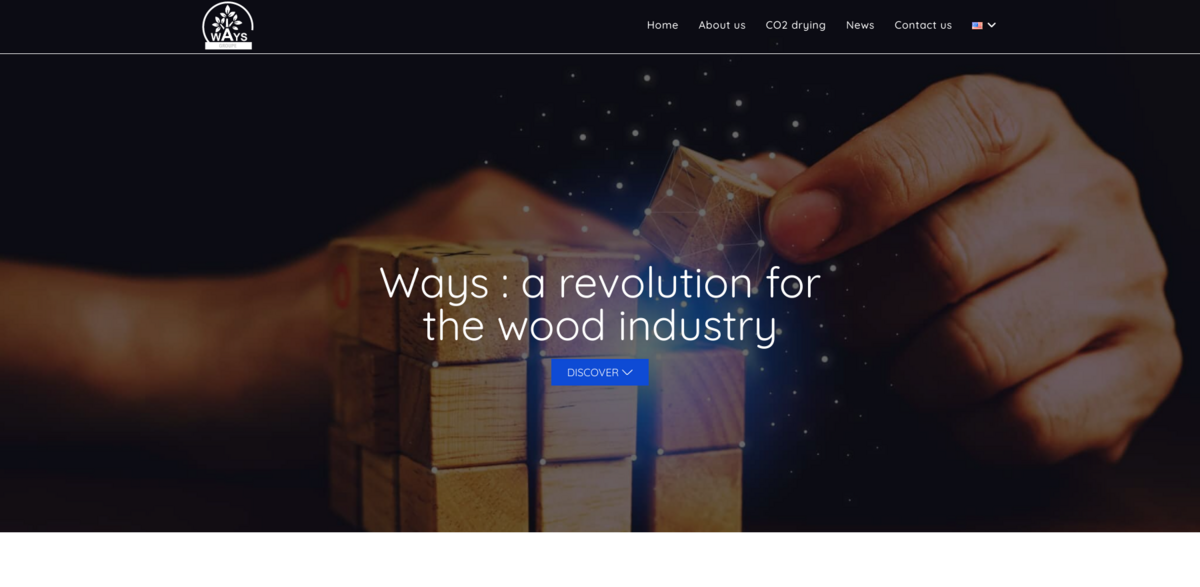What is WAYS?
WAYS: A REVOLUTION FOR THE WOOD INDUSTRY. Discover the WAYS Revolution – a world first that is transforming how wood is processed. This innovative process uses a disruptive drying solution that isn’t simply evaporating water; it substitutes H2O with CO2. Through a precise drying protocol executed under a hot CO2 atmosphere, the technology interacts with the bound water and the polymers within the wood, leaving the wood unscathed, stronger, and more stable. There is no size reduction, no raw material loss, and the wood remains exceptionally stable as humidity does not return in time. The process applies to all wood species, making it a unique technological breakthrough in the industrial drying market.
Main Benefits
- Exceptional Wood Quality: The technology allows for stronger and more stable wood, ensuring superior product quality.
- Substantial Savings: Drying time is drastically reduced, from several weeks or even months down to just 3 to 4 days, with significant material savings by avoiding shrinkage and deformation phenomena.
- Sustainable CO2 Sequestration: The process traps CO2 in the wood, making a significant contribution to emission reduction and sustainable forest management.
- Unmatched Drying Performance: The approach offers rapid drying even for species considered difficult to dry, achieving uniform target moisture levels.
Technological Innovation
The heart of the WAYS project lies in its CO2 drying technology, an elegant substitute that uses biogenic or recycled hot CO2 instead of conventional hot air. This chemical approach not only speeds up the drying process but also improves the overall performance compared to classical systems. Under CO2, wood dries in less than 72 hours compared to the typical 2-week cycle. Also, the process uniquely introduces carbon from gaseous CO2 into the wood, creating a permanent bond and ultimately storing CO2 for the lifetime of the product… a true game changer in terms of both wood quality and environmental sustainability.
Efficiency and Performance
The innovation is further exemplified by solutions like the Carbondryer V35, which industrially dries green wood uniformly with much less energy. Drying cycles are reduced dramatically – from several weeks to only 3 or 4 days – while drastically reducing energy consumption by about 20% less kWh per cubic meter of dried wood compared to traditional biomass boiler dryers. With local and difficult-to-dry species no longer a stumbling block, the drying process saves time, reduces material loss, and avoids the extensive storage times that typically disrupt supply chains. This efficiency boost is crucial for meeting the industrial demands and decarbonizing operations.
Sustainability and Environmental Impact
A major pillar of the WAYS project is its commitment to sustainability. The quality of the drying process allows for a significant reduction in wood consumption by exploiting underutilized local species, thereby lessening the environmental footprint. Additionally, the method uses CO2 emissions from surrounding industries, capturing and storing the gas in the wood. This innovative approach to CO2 sequestration means that a portion of recycled CO2 remains permanently trapped, thus playing a decisive role in the agroecological transition and reducing overall emissions. The circular economy concept is embraced fully, as the process valorizes by-products from methanization units, linking industrial practices to environmental care.
Operational Advantages and Implementation
The ease of implementation is another highlight of the WAYS technology. All components needed for the process are already available on the market. The operational simplicity, combined with the technological know-how, makes the process highly replicable across different industrial setups. There is no need for complex new machinery or expensive retrofits – the disruptive results arise from a pragmatic application of existing components. This characteristic ensures that industries can adopt the process with minimal disruption while enjoying its benefits immediately, such as material gain through reduced shrinkage and faster processing times. The process’s intuitive design encourages swift integration into current production lines.
Project Impact
- SDG 7 – Affordable and Clean Energy: Reduced energy consumption during the drying process.
- SDG 9 – Industry, Innovation, and Infrastructure: A pioneering approach in industrial drying technology.
- SDG 12 – Responsible Consumption and Production: Significant material savings and efficient use of resources.
- SDG 13 – Climate Action: Sustainable CO2 sequestration contributes to the reduction of overall greenhouse gas emissions.
Future Perspectives
The promising advances presented by the WAYS project pave the way for further industrial transformation. With the drying cycle reduced to mere days and the added benefit of CO2 storage, the technology opens up exciting new markets and helps in optimizing industrial performance. Increased sustainability, material preservation, and energy efficiency offer a compelling blueprint for the future of the wood industry. As more industries adopt this disruptive CO2 drying process, there is a clear message that innovation can go hand in hand with ecological responsibility – a path full of potential and much promise, driving the agroecological transition forward… The future of the wood market indeed looks brighter with such innovative strides.


















